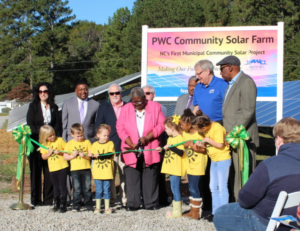NCCETC’s Policy Team Puts Clean Energy Policy into Action
The NC Clean Energy Technology Center’s (Center) Energy Policy team strives to advance a sustainable energy economy both locally and nationally. They conduct objective research and analysis and provide education and technical assistance on energy policy issues nationwide.
 Autumn Proudlove is the Senior Policy Program Director on the team. “Our team has longstanding expertise in energy policy,” she explains. “Where legislation and regulatory dockets can be really hard to navigate and understand what it means to you or your business, we summarize and break everything down to make it actionable for people.”
Autumn Proudlove is the Senior Policy Program Director on the team. “Our team has longstanding expertise in energy policy,” she explains. “Where legislation and regulatory dockets can be really hard to navigate and understand what it means to you or your business, we summarize and break everything down to make it actionable for people.”
WHERE CAN I FIND INFORMATION ABOUT RENEWABLE ENERGY POLICIES?

Our Senior Project Manager, Brain Lips, maintains the Center’s Database of State Incentives for Renewables and Efficiency (DSIRE), which is available publicly. Homeowners and businesses, the clean energy industry, utilities, policymakers and others can use this resource to understand the nation’s policy landscape state by state.
“DSIRE maintains information on policies and incentives that are currently in place,” Autumn says. “But a lot of people are interested in what’s on the horizon and what changes are currently being considered, so that’s why we launched DSIRE Insight in 2019.”

DSIRE Insight, a subscription service including the 50 States of Solar, 50 States of Grid Modernization, and 50 States of Electric Vehicles quarterly policy tracking reports, provides comprehensive tracking of solar, grid modernization, and electric vehicle policy activity across all 50 state legislatures and utility commissions.
In 2020, the Energy Policy team also launched two new research offerings through DSIRE Insight related to state implementation of the federal Public Utility Regulatory Policies Act (PURPA) and investor-owned utility avoided cost rates. Differences in these policies and rates can have a large effect on patterns of renewable energy development across states.
WHERE CAN MY COMPANY FIND INFORMATION ON LOCAL AND NATIONAL RENEWABLE ENERGY POLICIES?
The Center also offers customized policy research and analysis services to clean energy businesses, utilities, advocacy organizations and other industry participants. The team lends its expertise to companies and organizations interested in investing in clean energy technologies. “We try to provide objective policy information and analysis so that they can use that education to make informed decisions,” Autumn explains.
 Recently, the team wrapped up its four-year long Community Solar for the Southeast Project created to provide technical assistance and resources for the development of community solar programs at electric cooperatives and municipal utilities across the southeastern United States. The project wrapped up in mid-2020 after four years of the Center working with a number of electric co-ops and municipal utilities to understand the challenges of implementing community solar programs and develop resources that can aid in the development of community solar projects across the region.
Recently, the team wrapped up its four-year long Community Solar for the Southeast Project created to provide technical assistance and resources for the development of community solar programs at electric cooperatives and municipal utilities across the southeastern United States. The project wrapped up in mid-2020 after four years of the Center working with a number of electric co-ops and municipal utilities to understand the challenges of implementing community solar programs and develop resources that can aid in the development of community solar projects across the region.
 The Center has also partnered with Cliburn and Associates, LLC on the Solar-Plus for Electric Co-Ops (SPECs) project, which will help optimize the procurement and operations of battery storage projects at local electric cooperatives. David Sarkisian, Senior Policy Project Manager on the team says, “The policy team has helped the SPECs project research storage procurement and develop guidance for electric cooperatives to issue storage RFPs. We are also working on a white paper that looks at policy factors that electric cooperatives will need to consider when pursuing storage projects; we expect to release the paper during spring 2021.”
The Center has also partnered with Cliburn and Associates, LLC on the Solar-Plus for Electric Co-Ops (SPECs) project, which will help optimize the procurement and operations of battery storage projects at local electric cooperatives. David Sarkisian, Senior Policy Project Manager on the team says, “The policy team has helped the SPECs project research storage procurement and develop guidance for electric cooperatives to issue storage RFPs. We are also working on a white paper that looks at policy factors that electric cooperatives will need to consider when pursuing storage projects; we expect to release the paper during spring 2021.”
The type of support the Energy Policy Team provides varies for each individual client. “It might be an analysis of the policy landscape for their technology or a company searching for a certain state with policies that most benefit them,” Autumn says. Organizations are encouraged to reach out to the Policy team for customized research and analysis services.
WHAT’S TO COME IN 2021?
Last year, the DSIRE site was updated to include energy storage incentive programs and state energy storage targets. In 2021, the team has even more plans to expand the information the database offers on incentives and policies that support renewable energy and energy efficiency in the United States.
“We’re in the process of adding offshore wind, community solar, and electric vehicles and charging infrastructure to the database in 2021,” Autumn says.
Through DSIRE, the 50 States Reports, and customized research and analysis, the Energy Policy team is the source for understanding national energy policy and identifying market opportunities. Learn more about all the team has to offer, including the DSIRE website, DSIRE Insight services, and customized analysis and technical assistance.